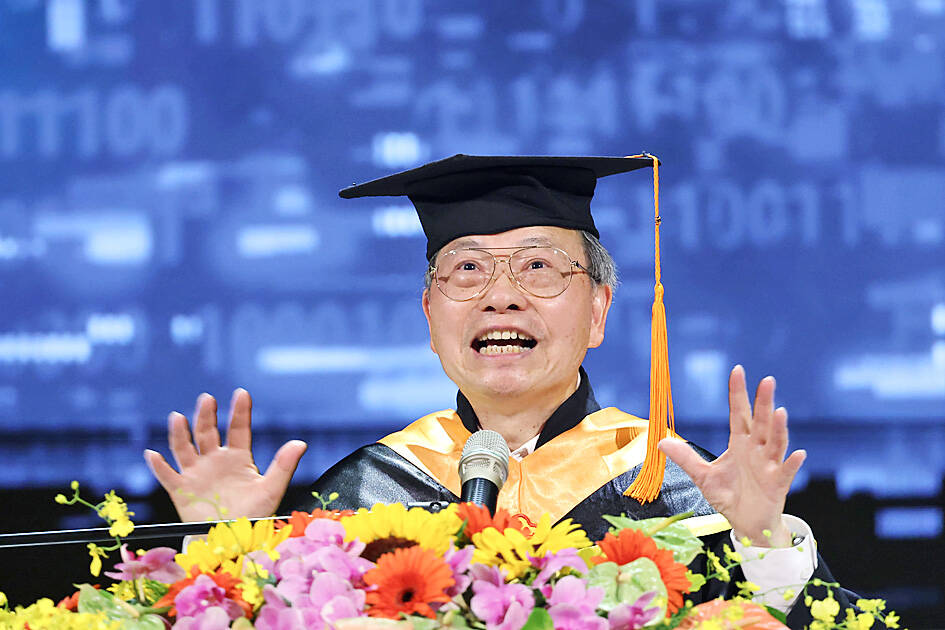US-based high-performance server maker Super Micro Computer Inc is planning to expand its presence in Taiwan and forge closer ties with the local industrial sector, Super Micro founder and CEO Charles Liang (梁見後) said on Saturday.
Expanding in Taiwan has become an operational priority for the company, he told reporters on the sidelines of a graduation ceremony at the National Taipei University of Technology (Taipei Tech), formerly known as the National Taipei Institute of Technology, from which Liang graduated in 1978.
Liang, a Taiwanese-American originally from Chiayi County, who received an honorary doctorate from Taipei Tech in 2011, founded Super Micro in Silicon Valley in 1993. The company went public on the NASDAQ in 2007.

Photo: CNA
Liang said Super Micro has built a science and technology park in Taoyuan’s Bade District (八德) and is planning to build another production site in Taiwan.
The new investment is expected to be announced in the next few months.
“It is not only in the United States, Super Micro is also expanding in Taiwan, Malaysia and Europe,” Liang said, “Taiwan is our top choice for investment as long as the timing is right.”
“Super Micro has enjoyed good growth, and that is expected to continue, so expanding our operations in Taiwan is a natural step,” Liang said.
At the end of 2019, the company announced an investment of about NT$20 billion (US$616.9 million) to build a science and technology park in Taoyuan to accommodate a research and development center, a software development center, a warehousing and logistics hub, and automated production lines.
Liang is in Taipei to attend Computex Taipei, one of the largest information technology (IT) exhibitions in the world, which starts tomorrow. On Wednesday, he is to deliver a keynote speech about Super Micro’s artificial intelligence (AI) infrastructure advancements, opportunities in the industry and strategies for deploying sustainable total IT solutions.
Liang said that he would meet Nvidia Corp CEO Jensen Huang (黃仁勳) during his stay in Taiwan, adding that he expects Nvidia to continue prospering in AI development.
In his graduation ceremony speech, Liang said that Super Micro had intensified efforts to surpass its peers and worked closely with its Taiwanese partners to bolster global competitiveness.
He remains upbeat about liquid cooling technology during the AI boom and would work with suppliers to obtain a 20 to 30 percent share of the global market next year, he said.
Liang said he donated 10 AI servers to Taipei Tech in the hopes that they would expand the school’s high-performance computing capabilities, cultivate an AI talent pool and boost research and development.

GROWING OWINGS: While Luxembourg and China swapped the top three spots, the US continued to be the largest exposure for Taiwan for the 41st consecutive quarter The US remained the largest debtor nation to Taiwan’s banking sector for the 41st consecutive quarter at the end of September, after local banks’ exposure to the US market rose more than 2 percent from three months earlier, the central bank said. Exposure to the US increased to US$198.896 billion, up US$4.026 billion, or 2.07 percent, from US$194.87 billion in the previous quarter, data released by the central bank showed on Friday. Of the increase, about US$1.4 billion came from banks’ investments in securitized products and interbank loans in the US, while another US$2.6 billion stemmed from trust assets, including mutual funds,

Micron Memory Taiwan Co (台灣美光), a subsidiary of US memorychip maker Micron Technology Inc, has been granted a NT$4.7 billion (US$149.5 million) subsidy under the Ministry of Economic Affairs A+ Corporate Innovation and R&D Enhancement program, the ministry said yesterday. The US memorychip maker’s program aims to back the development of high-performance and high-bandwidth memory chips with a total budget of NT$11.75 billion, the ministry said. Aside from the government funding, Micron is to inject the remaining investment of NT$7.06 billion as the company applied to participate the government’s Global Innovation Partnership Program to deepen technology cooperation, a ministry official told the

AI TALENT: No financial details were released about the deal, in which top Groq executives, including its CEO, would join Nvidia to help advance the technology Nvidia Corp has agreed to a licensing deal with artificial intelligence (AI) start-up Groq, furthering its investments in companies connected to the AI boom and gaining the right to add a new type of technology to its products. The world’s largest publicly traded company has paid for the right to use Groq’s technology and is to integrate its chip design into future products. Some of the start-up’s executives are leaving to join Nvidia to help with that effort, the companies said. Groq would continue as an independent company with a new chief executive, it said on Wednesday in a post on its Web

Taiwan Semiconductor Manufacturing Co (TSMC, 台積電), the world’s leading advanced chipmaker, officially began volume production of its 2-nanometer chips in the fourth quarter of this year, according to a recent update on the company’s Web site. The low-key announcement confirms that TSMC, the go-to chipmaker for artificial intelligence (AI) hardware providers Nvidia Corp and iPhone maker Apple Inc, met its original roadmap for the next-generation technology. Production is currently centered at Fab 22 in Kaohsiung, utilizing the company’s first-generation nanosheet transistor technology. The new architecture achieves “full-node strides in performance and power consumption,” TSMC said. The company described the 2nm process as